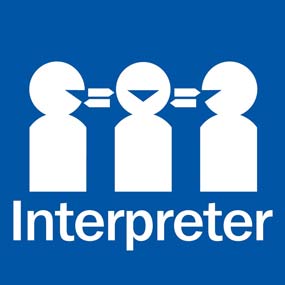Find a translator or interpreter
All Queensland Government agencies are required to provide and pay for qualified interpreting services for customers who are hearing impaired or have difficulties communicating in English.
It is important all, particularly frontline, staff are aware of the requirements under the Queensland Language Services Policy (PDF, 1.4MB), and the Queensland Language Service Guidelines PDF, 1.4MB.
These guidelines detail your organisation's responsibilities and obligations regarding:
- when and how to engage qualified interpreters
- procedures to obtain interpreters in planned and unplanned (emergency) situations
- how to respond to and distribute the Queensland Interpreter Card
- budget considerations for the payment of interpreters by your agency
- the benefits and importance of working with qualified interpreters for effective communication in legal, health and other government situations.
Refusing to provide these services may be considered discrimination under the Anti-Discrimination Act (Queensland) 1991.
Determine if you require an interpreter or translator
Check if your customer:
- has trouble communicating in English—refer to the Queensland Language Services Guidelines (PDF, 1.4MB) for help determining this
- presents a Queensland Interpreter Card
- is deaf or hearing impaired.
Find the right service
To help find the right type of service for the customer, you'll need to check:
- if immediate on-the-phone or onsite interpreting is required (video conferencing or Skype services may be available)
- the customer's language and dialect (indicated on their Queensland Interpreter Card if presented)
- if there are specific cultural requirements or sensitivities such as gender or ethnicity of the interpreter
- if the provider is appropriately qualified (certified or recognised by the certifying body NAATI).
Please be aware:
- Interpreters without NAATI credentials should only be used when the situation is an emergency and a qualified interpreter is unavailable. The potential for misinterpretation, addition of personal opinions or advice and/or misreading of language or cultural nuances is increased by using interpreters that are not qualified.
- NAATI provides an online resource to verify the NAATI credential.
- Bilingual/multilingual staff can support customers speaking their common languages, but they should not be used by agencies instead of qualified interpreters.
- Aboriginal and Torres Strait Islander languages are unique to Queensland. Make sure that interpreters are qualified in Queensland Aboriginal and Torres Strait Islander languages when using interstate language service providers.
Service providers
A Standing Offer Arrangement has been established for the provision of interpreting and translation services. This is a statewide whole-of-government arrangement available to all Queensland Government agencies and other eligible Queensland Government-funded service providers.
(Note: eligible Queensland Government-funded service providers can only access the Standing offer Arrangement if the funding Queensland Government agency has established a contract for the funded service provider.)
In accordance with principle 5.3 of the Queensland Procurement Policy , common-use supply arrangements are mandated for use to achieve savings and benefits wherever practical. For more information, contact HSQLanguageservices@health.qld.gov.au.
The benefits of this arrangement for Queensland Government customers include:
- alignment with the Queensland Language Services Policy (PDF, 1.4MB).
- suppliers fully understand the requirements and are prepared to invest to build a solid relationship to improve and sustain excellence in service
- simplified engagement process
- practitioners are paid in line with their level of accreditation and certification
- consistent standards and services are available across the whole-of-Queensland
- comprehensive, timely, accurate supplier performance management and standardised reporting
- value for money.
Access the following list of service providers, depending on your customer's needs:
